Parliament to Reconvene on Wednesday in Historic INA Building
ZAGREB, March 24, 2020 - The Croatian parliament will hold its sessions in the historic building of INA oil company given the damage Parliament House has suffered in earthquakes this past Sunday, and its members will discuss two government bills on Wednesday.
One is a bill to amend the Electronic Communications Act to facilitate access to information on persons violating self-isolation orders in the wake of the coronavirus epidemic.
The government proposes that the law be amended so as to include an article under which in extraordinary situations the health minister would be authorised to ask telecommunications companies to provide data on users' terminal equipment locations without transfer data. In practice, this means that the location of each person in self-isolation who has a mobile phone with them would be known, so it would be known whether they are violating self-isolation orders.
The law has so far stipulated that the data can only be used with the user's permission, which would no longer be necessary. According to the bill, the health minister may make the request when the government has declared a natural disaster or state of catastrophe, or when the minister has declared an infectious disease epidemic or a threat of an epidemic, and in such cases the purpose of the measure is protection of national and/or public safety.
The parliament originally planned to convene in the Zagreb City Hall in the Upper Town, but the decision was changed after statics expert assessed the building's safety and stability.
"We want to minimise the risk and go somewhere where we will be able to work safely", Parliament Speaker Gordan Jandroković said when asked why the parliament 'was returning' to INA's building.
The Croatian parliament held its historic session in that building on October 8, 1991, when it decided to sever all ties with Yugoslavia. The decision was made the day after Yugoslav People's Army (JNA) planes attacked the Banski Dvori (government headquarters) and MPs had to leave the building for their safety.
The parliament said that due to coronavirus protection measures, sessions would be attended by two members of each party group, while the voting would be done by a show of hands.
The session will be broadcast live by the Croatian Radio and Television (HRT) on its HRT4 channel, and it will also be transmitted on the parliament's web page and YouTube channel.
Only reporters, cameramen and photographers permanently accredited by the Croatian parliament will be able to enter INA's building. All of them have to follow instructions by the National Civil Protection Authority and the Croatian Institute of Public Health (HZJZ), that is, keep a distance of at least two metres from others and wear protective masks and gloves.
More coronavirus news can be found in the Lifestyle section.
Croatia Travel Update March 24, 2020: Borders, Flights, Restrictions, New Measures
March 24, 2020 - As the coronavirus dominates and the effects of the Zagreb earthquake are being felt, a Croatia travel update on flights, borders, restrictions and the new measures announced by the Government.
Things are changing very quickly as the coronavirus crisis escalates in Europe. A Croatia travel update on what is - and is not - open or running.
But if we were to sum up the travel advice in Croatia at the moment in one word, it would be this - don't.
Leading Croatian Scientist Igor Rudan explains why in his latest fantastic piece - Why We All MUST Stay at Home for At Least One Month
New Croatian Travel Restrictions Come into Force: What is Open?
Strict new travel measures were announced yesterday by Interior Minister, Davor Bozinovic, and they have already come into effect.
"The number of infected people is increasing; we expect further growth and these are necessary measures. It is important that the exceptions are those which are essential for the traffic and movement of goods and supplies - daily migrations in essential services, drug delivery, utilities, gas and electricity supply, journalists, emergency medical care,” Bozinovic said.
The new rules prohibit anyone leaving their place of residence (please note that place of residence means town/city, not your apartment) without special permission, or without the appropriate paperwork. A full translation of the new rules announced can be found here. The new measures have effectively brought non-essential travel in Croatia to a standstill.
For an overview of what is open and what is not, check out this morning's Overview of Coronavirus Measures: What's Open, What's Closed?
Croatia Travel Update: What is the Situation on the Roads?
Snow is falling in many parts of the country. The latest road update from HAK in English is below. Click on this link for the latest.
- on the A1 motorway between Sveti Rok and Posedarje junctions, detour: DC50/DC27 Gračac-Obrovac-Karin state roads.
- on the A6 Rijeka-Zagreb motorway between Kikovica and Delnice junctions (no free road for freight traffic);
- on the DC54 Maslenica-Zaton Obrovački state road.
- DC1 Krnjačko Zagorje-Slunj-Grabovac-Vaganac, Ondić-Gračac
- DC8 Senj-Karlobag
- DC23 Kapela-Žuta Lokva-Senj
- DC25 Korenica-Lički Osik
- DC25 Gospić-Karlobag
- DC31 Žuta Lokva-Lički Osik
- DC42 Stubica-Vrbovsko-Ljubošina
- DC52 Špilnik-Korenica
- DC217 Ličko Petrovo Selo-Ličko Petrovo Selo border crossing
- DC522 Udbina-Gornja Ploča
- ŽC5169 Bjelopolje-Donji Lapac
- all regional and local roads in Lika-Senj county;
- A6 Rijeka-Zagreb motorway, section Delnice-Kikovica
- DC3 Zdihovo-Vrbovsko-Kupjak-Delnice-Kikovica
- DC32 Prezid border crossing-Parg (DC305)-Delnice (DC3)
- DC42 Stubica-Ogulinski Hreljin
- DC203 Brod na Kupi border crossing-Delnice (DC3)
- DC305 Parg (DC32)-Čabar
- DC501 Gornje Jelenje-Meja
- ŽC5030 Platak-Kamenjak
- ŽC5032 Crni Lug-Mrzle Vodice-G. Jelenje (DC3)
- ŽC5191 Sopač (DC3)-Mrkopalj-Tuk
- ŽC5062 Kraljev Jarak-Fužine-Lukovo
- ŽC5068 Hreljin-Zlobin-Fužine
- ŽC5094 Breze-Stalak
- other regional and local roads in the area of Vrbovsko and Delnice;
- DC53 Dilj-Slavonski Brod-Slavonski Brod border crossing.
- at Sava bridge (most Sava) between Kosnica and Ivanja Reka junctions one lane is free only in each direction till 27 April (driving speed limit of 40 km/h);
- temporary traffic signals at Jankomir junction;
- traffic is closed at Lučko junction in/from direction Blato/Lučko on the DC1 state road till 15 April;
- traffic is closed at Novska jug and sjever rest areas;
- 24th-34th km between Ludbreg and Varaždin junctions one lane is free only in each direction; Varaždin rest area is closed in direction Zagreb till 29 May;
- at Vodnjan jug junction all traffic is suspended in both directions;
- between Rogovići and Vranja junctions one lane is free only due to roadworks;
- between Cerovlje and Lupoglav junctions traffic is occasionally suspended for 15 minutes at noon.
Croatia Travel Update: Are the borders of Croatia open?
This is the latest official information from HAK on the situation at the borders of Croatia. For the latest information (in English), check out the HAK website.
At the following border crossings transit freight traffic is allowed:
- at Bregana and Macelj (with Slovenia);
- at Goričan and Duboševica (with Hungary);
- at Nova Sela, Stara Gradiška and Slavonski Šamac (with Bosnia and Herzegovina);
- at Bajakovo (with Serbia).
Transit passengers information, if travelling through Republic of Croatia:
- use motorways only;
- use the following rest areas only: Novska jug, Novska sjever, Kozjak jug, Prokljan sjever, Draganić sjever, Draganić jug, Bačva and Ravna Gora;
- during breaks keep distance between You and other people;
- obey the rules of Civil protection or police officers.
At all border crossings with Croatia inbound traffic is allowed only to Croatian citizens (14-day isolation mandatory) as well as for some special groups of people, such as medical personnel, scientists, eldercare personnel, cross-border workers, freight traffic, diplomats, police officers, civil protection teams, international organizations members, militaries and transit passengers.
At the border crossings with Hungary, Serbia and Montenegro traffic is closed for all vehicles, except for the citizens of these countries as well as for freight vehicles.
Traffic is suspended at the following border crossings with Slovenia:Lucija, Slum, Vele Mune, Lipa, Prezid II, Zamost, Blaževci, Prilišće, Pravutina, Obrež, Vivodina, Kašt, Novo Selo Žumberačko, Kraj Donji, Gornji Čemehovec, Draše, Plavić, Luke Poljanske, Mali Tabor, Klenovec Humski, Gornja Voća, Preseka, Sveti Martin na Muri, Čabar, Cvetlin, Zlogonje, Banfi.
Due to roadworks, traffic is closed at the following border crossings:
- at Goričan border crossing, detour: Goričan junction-ŽC2026-DC3;
- at Dvor and Vitaljina border crossings - open only to passenger traffic;
- at Gunja border crossing - there is a traffic ban on freight vehicles and buses.
Due to traffic bans on freight vehicles in Slovenia long delays should be expected in freight traffic at Bregana/Obrežje and Macelj/Gruškovje border crossings starting 1 June.
Croatia Travel Update: Are the ferries in Croatia running normally?
This is the latest update from HAK:
- Prizna-Žigljen and Lopar-Valbiska ferries;
- Mali Lošinj-Unije-Susak ship.
RIJEKA area:
332 Valbiska-Merag:
departure from Merag: 5am, 6.30am, 12.30pm, 3pm, 7pm;
departure from Valbiska: 5.45am, 7.15am, 1.30pm, 3.45pm, 8pm;
334 Brestova-Porozina:
no journeys;
335 Prizna-Žigljen:
departure from Prizna: 7.10am, 11.10am, 3.10pm, 8.10pm;
departure from Žigljen: 7.30am, 11.30am, 3.30pm, 6.30pm;
338 Valbiska-Lopar:
departure from Lopar: 6am;
departure from Valbiska: 6.20pm;
ZADAR area:
431 Zadar-Preko:
departure from Zadar: 7.30am, 11.30am, 3.30pm, 6pm, 8.45pm;
departure from Preko: 7am, 10.30am, 12.15pm, 4pm, 6.40pm;
432 Biograd-Tkon:
departure from Tkon: 7.25am, 9.30am, 1.20pm, 6.10pm;
departure from Biograd: 8am, 11am, 2.30pm, 6.40pm;
434 Brbinj-Zadar:
departure from Brbinj: 6am, noon;
departure from Zadar: 10am, 4.30pm;
ŠIBENIK area:
505 Vodice-Šepurine-Prvić Luka-Zlarin-Šibenik:
departure from Vodice: 4.45am, noon;
departure from Šibenik: 9.30am, 3.30pm;
SPLIT area:
604 Split-Vela Luka-Ubli:
departure from Ubli: 4.30am;
departure from Split: 3pm;
606 Drvenik Veli-Drvenik Mali-Trogir:
departure from Drvenik Veli: 6am;
departure from Trogir: 3.30pm;
631 Split-Supetar:
departure from Split: 6.15am, 11am, 2.15pm, 6.15pm;
departure from Supetar: 6.30am, 10.30am, 12.30pm, 3.30pm;
632 Drvenik-Sućuraj:
departure from Sućuraj: 6.30am, 1pm, 6pm;
departure from Drvenik: 8am, 1.45pm, 7pm;
634 Orebić-Dominče:
departure from Dominče: 7am, 11.10am, 2.10pm, 5.40pm, 8pm;
departure from Orebić: 7.20am, 11.30am, 2.30pm, 8.30pm;
635 Split-Stari Grad:
departure from Split: 8.30am, 6.30pm;
departure from Stari Grad: 5.30am, 3.30pm;
636 Split-Rogač:
departure from Rogač: 5.30am, 10am, 5.30pm;
departure from Split: 6.45am, 11.15am, 8.30pm;
638 Makarska-Sumartin:
no journeys;
DUBROVNIK area:
807 Dubrovnik-Lopud-Koločep-Suđurađ:
departure from Suđurađ: 6am, 11.55am;
departure from Dubrovnik: 10am, 4.30pm;
831 Dubrovnik-Lopud-Suđurađ:
departure from Suđurađ: 8am;
departure from Dubrovnik: 3pm;
832 Prapratno-Sobra:
departure from Prapratno: 7am, 5pm;
departure from Sobra: 6am, 3pm.
The following lines operate regularly:
RIJEKA area:
310 Mali Lošinj-Srakane Vele-Unije-Susak-Mali Lošinj;
ZADAR area:
401 Zadar (Gaženica)-Ist-Olib-Silba-Premuda-Mali Lošinj;
433 Zadar (Gaženica)-Rivanj-Sestrunj-Zverinac-Molat-Ist;
435 Zadar (Gaženica)-Bršanj (Iž)-Rava-Mala Rava;
ŠIBENIk area:
532 Šibenik-Zlarin-Obonjan-Kaprije-Žirje;
SPLIT area:
602 Split-Vis;
633 Ploče-Trpanj (Pelješac).
As reported earlier on TCN, Jadrolinija is now requesting that passengers make their ticket purchases online or via their app.
You can check the latest from Jadrolinija on their website.
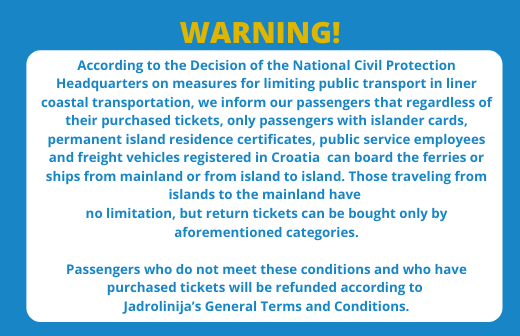
(From the Jadrolinija homepage)
Croatia Travel Update: What is the situation with train travel in Croatia?
The latest HAK update on the railway is here:
But please be aware that at the March 21 press conference, it was announced that there would be a suspension of all bus and train connections between cities.
Croatia Travel Update: What is the situation with flights to Croatia?
The closing of the EU external borders took effect a couple of days ago, a measure that will last for 30 days. As such, all international flights outside EU borders have now been cancelled. There are still flights to Zagreb within EU borders, and so there is not a total flight ban, as ExYuAviation noted a few days ago:
The EU travel will only partially affect Croatia. Under the plan, only visitors from non-EU states will not be allowed to enter the region unless they are long-term residents of the EU, family members of EU nationals, diplomats, cross-border commuters, or essential workers like doctors, nurses, and researchers. The majority of Croatia Airlines’ network is concentrated within the EU, however, plummeting demand and various national restrictions will see the carrier cancel at least nine return flights today, among which are services to cities outside of the block such as Sarajevo and Skopje. Furthermore, flights from Zagreb to Copenhagen, Vienna and Munich have also been cancelled so far today. Despite the new circumstances, Aeroflot, Turkish Airlines and Qatar Airways will operate their flights to the Croatian capital today.
HOWEVER, checking the Zagreb airport departures page today, there are two non-EU flights are not cancelled according to the Zagreb Airport website - Sarajevo and Istanbul. Here is the Zagreb Airport departures page for the latest info. Contact your airline for the latest news regarding your flight.
Most flights from Split are cancelled, but there are currently two flights Zagreb showing for today, and one for tomorrow. Check the timetable here.
Dubrovnik Airport has been closed, as there has been a positive COVID-19 case among the cleaning staff.
Croatia Airlines also have a dedicated information page on which of their flights are going, as well as flight cancellations.
We have had a LOT of emails asking what will happen with flight cancellations, and will things be ok in May, June and beyond. Obviously, we have no idea how things will develop. With the 30-day international ban, most flights are already cancelled. We hope the situation will improve, but recommend you check with your individual airline, who will be better informed than us. If there are any major announcements, we will publish them on TCN. Please do not contact us with individual queries about your flight, as we have limited resources currently and are unable to help more than this update.
Croatia Travel Update: Are buses running in Croatia?
According to the March 21 press conference, all bus routes between towns are being suspended.
However, some bus lines will run for those who require public transportation to get to work, like those in public and other services under the responsibility of the Civil Protection Headquarters.
If you have any questions, check the website of your local public transportation service.
Croatia Travel Update: Are taxis running in Croatia?
Taxi applications are still working in Croatia, though you'll notice a drop in drivers who didn't want to risk coming in contact with passengers.
Many taxi companies in Croatia are also offering free rides to medical staff to and from work.
What about ZET Passes in Zagreb?
The City of Zagreb has issued a statement on ZET passes.
The Civil Protection Headquarters pass for ZET emergency transport is issued through the employer to the employees:
- health institutions from the City of Zagreb,
- employees in the social protection system of the City of Zagreb,
- pharmacy staff in the City of Zagreb,
- mobilized volunteers of the City of Zagreb Civil Protection,
- employees of public services (ministries, City Administration - affiliated institutions, municipal and traffic police, employees of Zagreb Holding and affiliated companies).
Passes are not issued to employees in the system:
- MUP,
- the MOD,
- the Directorate of Civil Protection,
- Public fire brigades of the City of Zagreb,
- mobilized members of voluntary fire companies.
They use extraordinary ZET transportation on the basis of their employer ID, the statement said.
Croatia Travel Update: What are the self-isolation rules for people arriving, who do they apply to, and what is the procedure?
There has been a lot of confusion about the mandatory 14-day self-isolation requirements, what they entail and how they are enforced, as well as who they apply to. I am very grateful to Lauren Simmonds for this excellent overview, having contacted and worked through various sources of conflicting information. Check out Lauren's guide to self-isolation in Croatia here.
The Croatian Government has launched a new information website to coordinate all information about coronavirus in Croatia, called Koronavirus.hr. This includes a page (in Croatian - Google Translate is your friend) called Going on a Trip?
If you have any reliable information to improve the resource above, please contact me on This email address is being protected from spambots. You need JavaScript enabled to view it. and I will update if relevant.
For the latest on the coronavirus crisis in Croatia, follow the dedicated TCN section.
For the latest information on the Zagreb earthquake, you can find the TCN coverage here.
Stay safe!
Croatian Government Opens Donation Fund for Zagreb Earthquake, Coronavirus Patients
March 24, 2020 - The Croatian government has opened a donation fund to help those affected by the Zagreb earthquake and the coronavirus. The campaigns are titled “Together for Zagreb" and "Croatia against coronavirus”.
Index.hr reports that the Prime Minister's Office said in a statement that Zagreb and its citizens were hit by the strongest earthquake in the last 140 years, measuring 5.5 on the Richter scale.
In order to enable the payment of donated funds through the state budget account for the purpose of earthquake rehabilitation, the decision to open a donation account in the "Together for Zagreb" action shall determine the account numbers to which the donations will be paid.
To donate to “Together with Zagreb”
Donations within Croatia are paid to the account: HR1210010051863000160, with reference to the approval number: HR68 5371 - and their OIB number.
Donations from outside Croatia will go into the account of the Ministry of Finance with the Croatian National Bank, to the account number IBAN: HR12 1001 0051 8630 0016 0
“To donate to "Croatia against coronavirus”.
Donations within Croatia are paid into the account HR1210010051863000160, with reference to the approval number: HR68 5380 - and their OIB.
Donations from outside Croatia are paid into the account of the Ministry of Finance with the Croatian National Bank, to the account number: IBAN: HR12 1001 0051 8630 0016 0
In the Government press conference, Plenkovic said:
"The pandemic is changing the world. Functioning as we know it is changing. In just three months, the pandemic has arrived in 195 countries ... The number of cases is accelerating. We predict that the pandemic will take many lives ...
The scale will have unprecedented economic consequences for the whole world... We were convinced that the biggest crisis with us had passed. We had a crisis around Agrokor. Thanks to our measures, we have prevented the costs that had to go to the budget. Today, three years later, this is happening.
What we presented last week was the first crisis plan.
Our economy is slightly stronger than it was before this crisis.
We have reached the highest number since independence, returning our economy to a higher level since before 2008.
There is now a battle to maintain production and preserve jobs. We are aware of the situation in which our businessmen are in, all of them are in the sales channels, all of whom, through their hard work, contribute to our society functioning in increasingly difficult circumstances.
It is certain that this crisis will last longer than a few months and will affect all our activism.
We are witnessing asymmetrical shock.
We will go to cut all costs that are not necessary on the expenditure side. All of these measures have been prepared in a unique and holistic way, designed as a conceptual approach for this first initial phase.
We had a government phone call on the day we opened the accounts: one for Zagreb and the other for combating the coronavirus, so anyone can donate.
We will donate our salary for March to the Zagreb account."
Follow TCN's live updates on the coronavirus crisis and the Zagreb earthquake.
Croatian Institute of Public Health Director Explains Who Needs Masks, Who Doesn't
The Croatian Institute of Public Health has had its work cut out for it lately. With new and stricter measures being implemented all the time at the state level, the latest of which being a ban on people leaving their place of registered permanent residence, the Institute has even more work on its hands keeping people up to date and calming potential hysteria.
If there is one thing that might be even more heavily discussed than coronavirus, then its the masks themselves. Many people are tired of the endless questions about masks, and the fact that they keep rapidly selling out and being worn by people for whom they serve little to no purpose.
As Poslovni Dnevnik writes on the 24th of March, 2020, the director of the Croatian Institute of Public Health, Krunoslav Capak, once again went into more detail at a press conference, at which he talked about whether healthy people should wear disposable surgical masks or not, and how useful canvas masks really are.
Capak said that ordinary cotton masks, when it comes coronavirus, have a more psychological meaning than they do anything else at all.
"For coronavirus, a three-layer surgical mask has been proven to be a barrier because it has a single plastic layer - which is why it's recommended for those already ill to prevent it from spreading further. For medical professionals and those in contact with the sick, there are special masks that completely protect them when they're used properly.
Requiring people to wear masks when entering a store makes no sense if you're talking about healthy people. For those who are ill, yes, it's good to wear masks, especially if they're sneezing or the like, but it's not necessary. We haven't made recommendations for wearing a mask for people who are healthy, nor do we think those recommendations are useful,'' Capak said.
Make sure to follow our dedicated section for all you need to know in English about coronavirus in Croatia.
Realities of Running an English News Portal in Croatia in the Corona Era
March 24, 2020 - Running an English-language news portal in Croatia is a challenge at the best of times, but these are far from the best of times. A look behind the scenes at TCN in the corona era.
These are extraordinary times in Croatia, and today's snow over much of the country after a winter with almost no snow was the latest confirmation - to me at least - that Croatia really was the global leader in unpredictability.
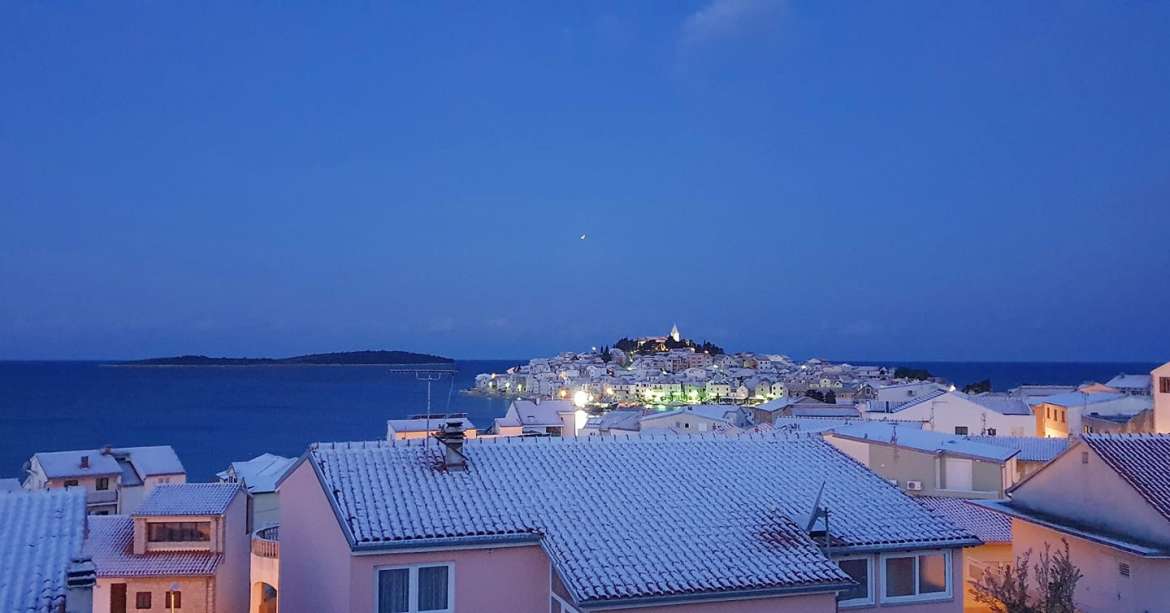
(Spring in Primosten - Photo by Sime Saric)
And nothing was more surreal than on Sunday, when my phone starting ringing at 06:25, my WhatsApp and Messenger ablaze with the very same message so early in the day:
Earthquake.
The shocking news was yet to sink in of the quakes that shook the Croatian capital, but now it was time to work. Our first report of the Zagreb earthquake was published at 06:39, just 15 minutes after the first earthquake struck. It was the first to hit the Internet in English and be indexed by Google News.
It was obviously not quite the start to the day I had planned. The early morning calls did not wake me, for I was already at my laptop working on the first article on the topic that would surely dominate the Croatian news that day - coronavirus.
I was wrong.
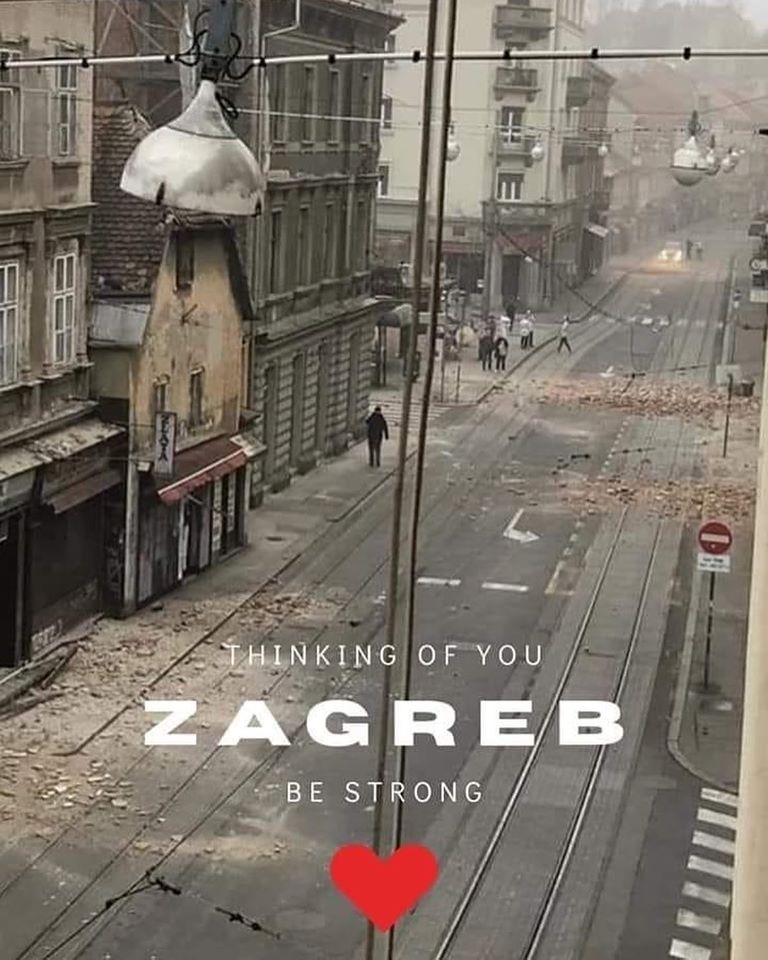
I was chained to the laptop all day, trying to cover as much as I could myself while marshalling the rest of the TCN team. A team that was a little slimmer than last week, as the reality of the corona effect on all of our lives economically reared its ugly head in the form of client cancellations, which sadly has resulted in staff cutbacks at TCN. A temporary measure, we hope. But in this crazy uncertainty, hope is all we have.
The earthquake was not kind to our Zagreb team.
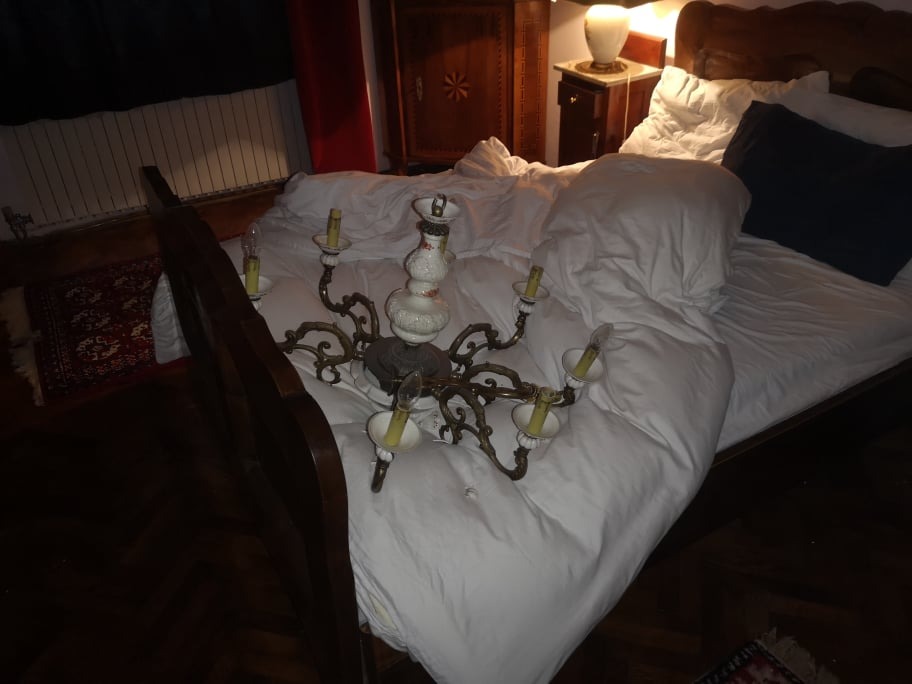
(Photo credit Forrest Stilin)
TCN's Forrest Stilin had arguably one of the most harrowing starts to the day of people in Zagreb - the double whammy of a 06:24 earthquake with a magnitude of 5.5 combined with the bedroom chandelier landing on his bed. Fortunately, Forrest has trained himself for such eventualities over the years and always sleeps in the middle of the bed. A fortunate escape. Drzi se, Forrest! We hope you are doing ok.
Forrest remains without Internet or gas some three days later, as well as a rather claustrophobic feeling of confinement with the new reality. Without Internet, he is unable to wrote for TCN, of course, but that is the least of our worries. We look forward to having him back online after recovering from the stress of this ordeal.
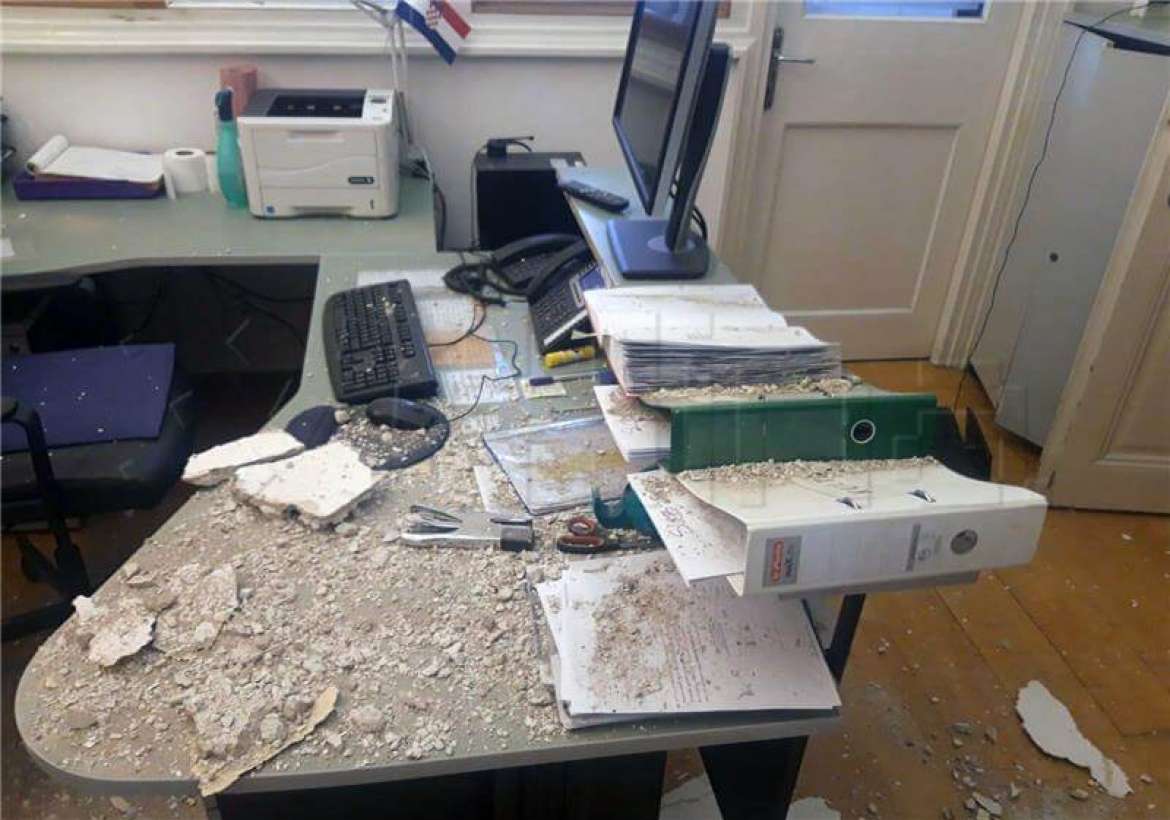
Forrest was not the only TCN victim of the earthquake. The State media service, HINA, with whom TCN has been cooperating for a couple of years, had its building severely damaged (the photo above is from the HINA Twitter feed) - you can read more about it here. But despite the considerable inconvenience, HINA soldiered on at a time when its readers and subscribers needed it most. Bravo!
TCN's beloved editor, Lauren Simmonds, was also caught up in the earthquake, although she suffered more damage the following day with the 3.7 magnitude earthquake which came 11:12 on Monday. It felt strong, said Lauren, and we were live with the story three minutes later. I asked Lauren to send me something that reflected her reality for this story.
The once busy view from her apartment - a lone fire engine cleaning up after the earthquake.
Sunday was easily the most intense day in TCN history (as well as the second busiest, with more than twice as much traffic as the World Cup Final on July 15, 2018). There were huge coronavirus stories and new travel restrictions to report on as well, and just when I was about to call it a night...
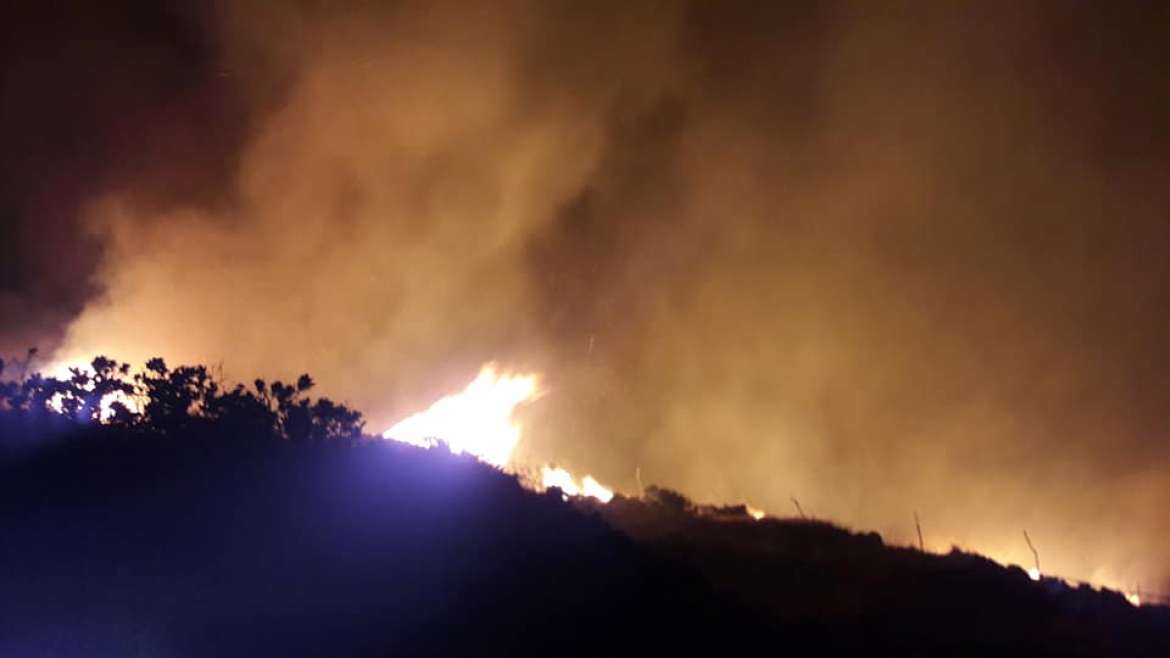
This.
A large fire had broken out on the south side of the island of Hvar, between Zavala and Ivan Dolac, with some 40 firefighters and 12 fire engines battling the blaze. We were live minutes later, with a morning update that the fire had been brought under control around 01:00.
And where was I, reporting on all this madness around me?
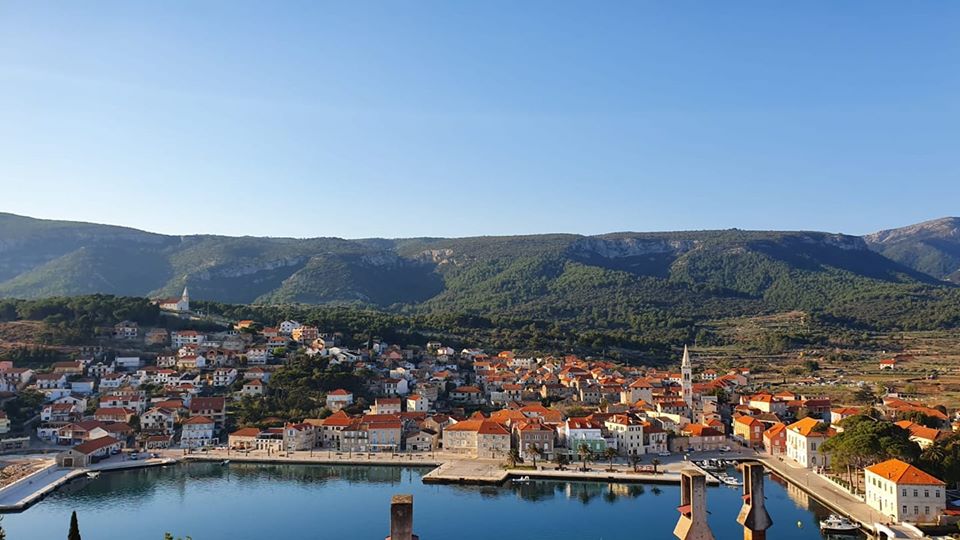
For the most part, lying in bed, self-isolating in our home in Jelsa, with sunshine beaming through the windows, a tranquil scene below. The first corona case had been reported a few kilometres away just days before, but this was a haven compared to the madness around, and it felt all the more surreal while reporting on all the chaos around.
There are pros and cons of self-isolating on an island rather than the mainland, as I explored in The Realties of Self-Isolating on Hvar, Croatia's Premier Island.
But that view, and the feeling of relative safety, nature, and plenty of space with a very supportive family, are some very big positives.
Things are tough all round at the moment, and everyone is dealing with their own corona hardships.
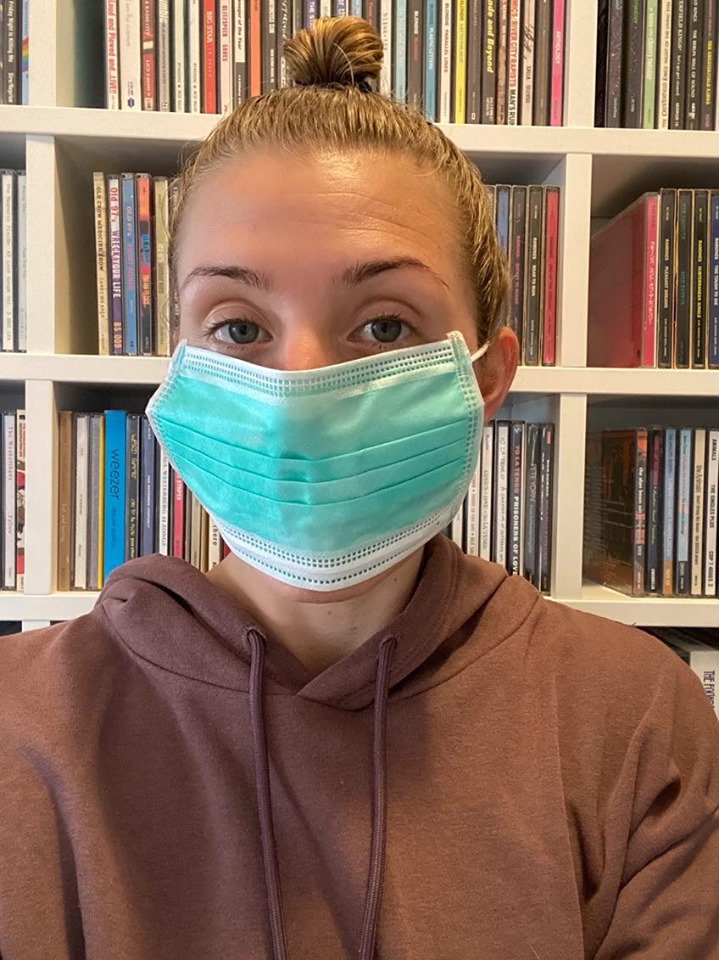
Dani has been with TCN for almost four years now, and she has done a magnificent job for us, covering so many topics for us that we have both lost count. And she has risen to the challenge once again, putting her personal difficulties to one side to perform above and beyond the call of duty.
The funny thing is that although Lauren, Dani and I have been the core of TCN for almost four years, we have only physically been together all three of us at the annual TCN Xmas party and one other occasion. And yet despite that, I have probably the best working relationship and team spirit of my life with these two magnificent ladies, who are both superb in times of crisis. Only my time working with outstanding colleagues in the wake of the Rwanda genocide in 1994 comes close.
Thank you ladies, you are both beyond fabulous, and thank you for all you do (and I know I speak for many others when I say that). Someone from New York messaged me recently to thank us for our work and was surprised at how few people worked on TCN and our Slovenian and Montenegrin portals.
"I thought you had about 50 people," the New Yorker said. With colleagues such as Dani and Lauren, it can seem that way I guess. The last three days has made our bond all the stronger.
Here is Dani, mask on in Split, and currently living with parents and grandmother. As the only under-65 in the household, her responsibilities go beyond just writing for TCN.
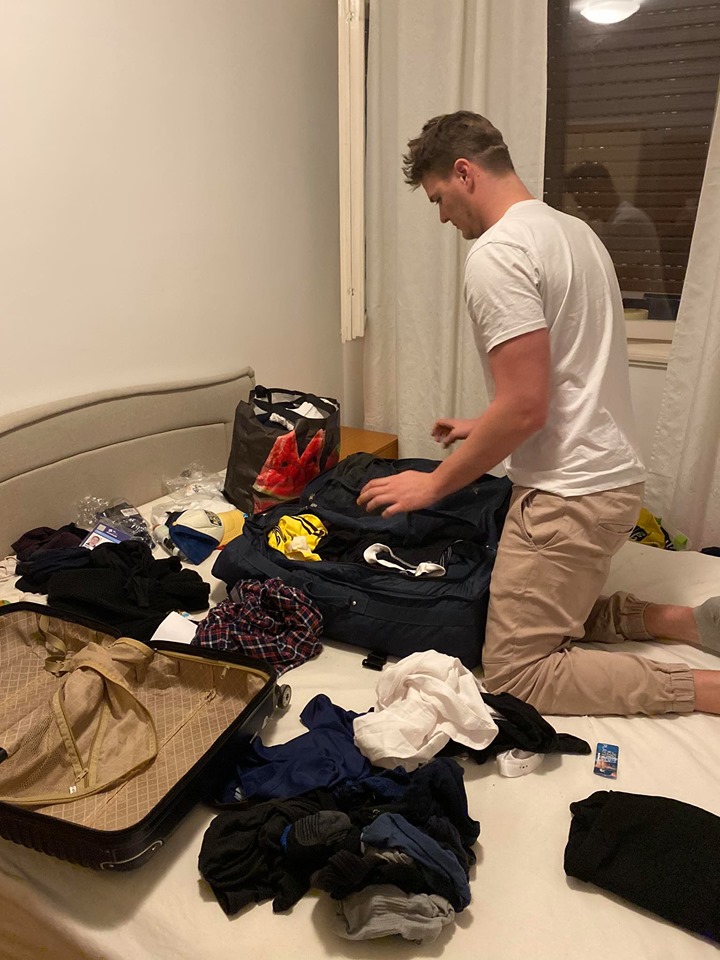
She too, is facing other new realities, as boyfriend Nathan, part of the Australian waterpolo team, was then told to return to Australia by his coach for Olympics training before Europe locked down. After much stress and packing up his apartment until 04:30, he took the first Splt flight to Zagreb on the day the EU flight ban came into effect at midday, not knowing if he would be able to fly at 14:00. More stress, but he made it, and was welcomed home to Australia and a mandatory 14-day self-isolation and an uncertain future.
To prepare for an Olympics which will not take place this year.

Other occasional TCN contributors were living their own self-isolation realities - here is intern Janja, who is already well-versed in the art of self-sufficiency in her village near Varazdin. She also found time to write about the experiences of those communities who were at the very epicentre of the earthquake, communities which have been largely ignored with all the focus on Zagreb.
Self-isolation means no socialising with anyone, and a lonely walk for an hour each evening when there is nobody around. A tour of the Jelsa riva the day after all the cafes and restaurants closed.
And what of the reporting itself?
I started Total Hvar almost nine years ago, a happy tourism blog about the idyllic island of Hvar. I am not quite sure how that got transformed to three Google News websites for Croatia, Montenegro and Slovenia, but here we are. Since starting TCN, I have come to learn how many people (expats here, parts of the non-Croatian-speaking diaspora, and tourists with a love of Croatia) depend on TCN for their news and updates about Croatia in English. And this has never been more true than the current moment, when there is so much fear, uncertainty and fake news around.
I talked to the core team and we agreed that we had a social responsibility to report as much as we could, as accurately as we could, and in as detailed a manner as we could. We would not get it right every time - how could we, confined to our homes in different parts of the country - but we would give our best. The Croatian online community is a brutal audience at the best of times, and we long ago established that a foreigner has no right to an opinion here. I actually quite enjoy the levels of abuse I receive these days, and I reward the best of them with a guest appearance on my Troll Friday series on my Facebook page.
But with opinions divided, stress levels high, and emotions all over the place, would it be possible to navigate the waters of an audience of Croatian keyboard warriors?
(My only social life these days - my daily Tinder date with the bura - a welcome escape from the stress, if only for an hour)
In order to encourage some better behaviour from our commentators, I decided to post a request on the TCN Facebook page for people to think before they commented in these stressful and emotional times. I have only banned 28 people in 9 years of the Total Project, mostly for hate speech of the ultimate crime of being highly irritating. Just as reading TCN is not compulsory, so too reading some of the horseshit that passes as comment. I announced that we would be taking a more proactive approach to ban aggressive, abusive and irritating posters. A policy, I am pleased - and rather surprised - seems to have worked. Only two people banned so far with the new regime.
Of course, we don't get it right every time - how could we, confined to our homes? And it has been instructive to observe how quickly some people jump down our throats to accuse us of fake news and sensationalism. Reporting for example, on the death of a 15-year-old girl in the earthquake as the Croatian media did, only to then learn that she had been resuscitated (she has since sadly passed away). Or reporting that earthquake that Lauren said was strong the following day to be accused of stoking up an already emotive situation in the name of clicks, when it was merely an aftershock.
Suffice to say that the coronavirus has taught us all a LOT about each other, and I for one have learned who I do - and who I do not - want to know on the other side. And some of those don'ts have really surprised me.
Our job has been made a lot easier by the superb support we have around us. First and foremost, to the whole team at Index.hr, whose timely reporting, live updates, and great map and stats, have been easily the best source of information from day one, a time when others were dismissing the pandemic.
A big shout out to all the officials coordinating the crisis response, both in terms of steps made and communication to the population. I hope both Vili Beros and Alemka Markotic get their own statues on Ban Jelacic Square when all this is over.
And to the various contributors to TCN, who have helped take some of the load. We are thrilled to have Igor Rudan on our team, whose authoritative scientific texts have become required reading far beyond Croatia's borders. Here is his latest.
Other great contributions this week include Aco Momcilovic for the Voice of the Entrepreneur, Ivica Profaca's Diary of a Split Tour Guide in the Age of Corona, and Zoran Pejovic with some positive advice for those in the tourism industry.
Thank you all, and we welcome quality contributions at all times - please contact me on This email address is being protected from spambots. You need JavaScript enabled to view it. if you are interested.
And that, as they say, is that. The only other thing to add is that the 8 bottles of gin in the lead photo are sadly empty, and have been since the summer of 2014.
We thank you for all your support in these difficult times. We will not get it right every time, but we are doing our best to play our little part in helping us all get through this crisis.
And I leave you with the most important advice of all, especially if you are in Dalmatia.
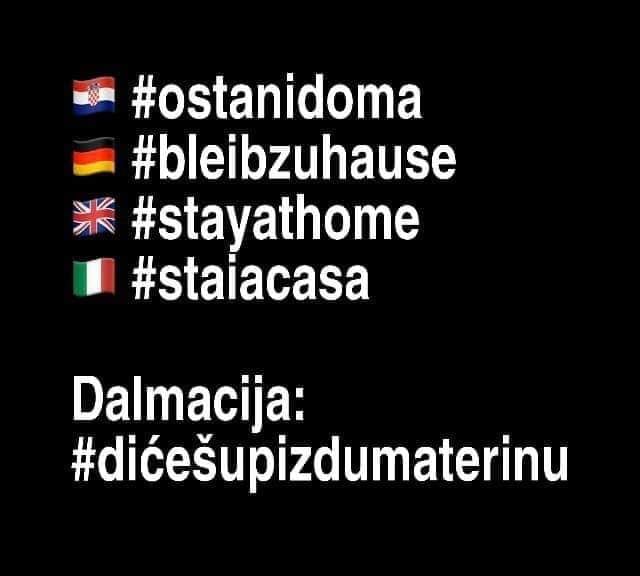
Croatia: Council of Europe Anti-Corruption Group Calls for More Integrity in Government and Law Enforcement
Strasbourg, 24.03.2020 - The Council of Europe’s Group of States against Corruption (GRECO) has published today its fifth round evaluation report on Croatia dealing with preventing corruption in government (top executive functions) and the police.
GRECO’s report recognises that Croatia has the tools in place to promote integrity and prevent corruption in the public sector. At the same time, however, the report points to where improvements should be made, both in legislation and in practice. To start with, GRECO considers that developments in recent years have shown a need to ensure that integrity standards also apply to people working in an advisory capacity for the government. More specifically regarding members of the government, state secretaries and assistant ministers, the report calls for the adoption of a code of conduct, to be supplemented with practical guidance, briefings on the integrity rules in place and confidential counselling. GRECO further recommends that the current rules on the taking up of employment – when a person entrusted with top executive functions leaves an official position – need to be broadened and considers that the lack of rules on reporting and disclosing contacts with lobbyists/third parties that seek to influence the public decision-making process constitutes a gap. This gap must be filled in order to further improve transparency.
Similarly, requirements need to be introduced for persons entrusted with top executive functions to disclose situations in which their private interests may conflict with their official functions and to submit their financial declarations to the Commission for the Prevention of Conflicts of Interest more frequently than is currently the case. To help the Commission in carrying out its tasks, GRECO emphasises that more should be done to better enable the Commission to obtain the information it needs to verify financial declarations of government members, state secretaries and assistant ministers. In this connection, GRECO also stresses the importance of officials (irrespective of their position) showing full cooperation with independent institutions such as the Commission.
When it comes to the police, the report notes a relatively low level of trust in the police and considers that more needs to be done to prevent corruption risks within the police itself. Such efforts should start with comprehensive risk assessment of corruption-prone activities within the police, as a basis to adopt an integrity and anti-corruption strategy for the entire police force. The report furthermore acknowledges the existing code of ethics for police officers, but considers that it would need to better cover all integrity matters and be supplemented with an explanatory manual to become a truly practical tool and a reference point for the to-be-revised police trainings. Furthermore, more attention needs to be paid to the current appointment and promotion processes of police officers and their employment after they leave the police. Finally, GRECO recommends that a requirement be established for police staff to report integrity-related misconduct they come across in the police service.
The Croatian authorities are required to report back to GRECO by mid-2021 on the measures they have taken to implement the recommendations contained in the evaluation report, which will be assessed by GRECO through its compliance procedure.
* * *
The Group of States against Corruption (GRECO) is a Council of Europe body that aims to improve the capacity of its members to fight corruption by monitoring their compliance with anti-corruption standards. It helps states to identify deficiencies in national anti-corruption policies, prompting the necessary legislative, institutional and practical reforms. Currently it comprises the 47 Council of Europe member states, Belarus, Kazakhstan and the United States of America
Contact : Panos Kakaviatos, Spokesperson/Media officer, Tel. +33 6 98 37 64 04
Overview of Coronavirus Measures, What's Open, What's Closed?
March the 24th, 2020 - Despite the endless articles about coronavirus in Croatia as the situation begins to escalate and the country introduces more strict measures, many are still being left somewhat confused by statements that have been a little vague in some cases.
Let's take a look at the measures now in force in Croatia in an attempt to stop the spread of COVID-19.
Entering Croatia:
You must be able to demonstrate that you have an address and legal residence in Croatia in order to enter.
Social distancing:
Social distancing has been required for a while now. While initially fairly liberal in its nature, it asks that people don't gather in groups of more than five, and that a distance of one metre or more is kept between each person. Since people failed to respect this request initially, stricter measures are now in force. Unless you are going home, to the shop, to the pharmacy, or to and from work if there is no way for you to work from home (this applies mainly to key workers and those in healthcare), you should remain indoors.
Hanging around, gathering or staying out on the street is prohibited and the police can fine you for doing so.
How should I behave in pharmacies?
At the entrance to pharmacies, new measures are in place to avoid any crowding.
One staff member will serve one person and there will be no lines and waiting. After that person is dealt with, then another person can enter the pharmacy. It is an absolute must that you keep a distance of at least one metre between each other when waiting to enter the pharmacy.
It is mandatory to keep a distance of at least 1.5 metres between you and the staff member when speaking to them.
When buying disinfectants, masks and medicines, keep in mind that sales are limited and try to avoid selfishly purchasing more than you need.
Use a card payment method, preferably. Money is dirty at the best of times.
If you cough and sneeze, make sure to cover your mouth and nose and if possible, do so with a piece of tissue paper, which you then discard into a waste bin with a lid outside the pharmacy and wash your hands.
When coughing and sneezing, turn your face away from other people.
If you have respiratory issues (such as coughing, sneezing, a sore throat, a fever, or shortness of breath) please do not go to the pharmacy yourself. Instead, call your doctor or call 112.
How should I behave in stores?
All stores and their manufacturers have enough goods in stock and you won't run out of what you need, so please don't go into a panic buying frenzy and forget about the needs of other people. Empty shelves in stores are mainly a result of the fact that it's impossible to fill them fast enough, and not because products are lacking in actual supply. This happens in cases where a large number of customers are looking for the same product and there is no big conspiracy behind it. Give the staff a chance.
When shopping, you need to keep a sufficient distance between yourself and other customers, especially when paying. Try to avoid going to the store in times when there are typically more people wanting to shop.
Wash your hands thoroughly before going and especially after leaving the store. Washing your hands regularly is the most important protection for you and others against COVID-19.
Thoroughly wash the fruits and vegetables you've purchased and are going to directly consume.
Try your best to not touch your mouth, eyes or nose while shopping and avoid contact with other customers.
If you are over 65 years od age, do not go to the store yourself. Ask your neighbours, relatives, friends or acquaintances to do your shopping for you.
Try to forget all about cash for the time being and pretend it doesn't exist. Instead, get into the habit of making card payments. Don't hand your debit or credit cards over to the merchants but lean them on the POS devices yourself. If you need to sign, bring your own ballpoint pen and don't rely on the ones the shop has. Something as simple as that can help to prevent coronavirus' potential spread.
Don't get into panic mode. The supply in stores is currently functioning normally, even in countries where the number of infected people is extremely high. Don't let panic overwhelm you and push you into selfishly endangering your own health or that of other people.
What is open and what is closed? What's the current regime?
According to Slobodna Dalmacija, grocery stores have adjusted their working hours since the introduction of new measures and now operate from 08:00 to 17:00. This includes those selling hygienic supplies.
Pharmacies are open until 17:00.
Markets are no longer in operation at all.
Fuel stations operate on a regular basis.
Stores which don't sell food and medicine are currently closed complerely, but many do still deliver, so make sure to check on their respective websites.
Pubs, cafes, bars and fast food restaurants and establishments are no longer open, but an increasing number of restaurants and other establishments are still delivering as normal. It is important that food providers, as well as those who prepare these foods, follow strict hygiene instructions so as to limit the possible spread of coronavirus as much as possible. Persons doing deliveries should also have disinfectant sprays with them.
Veterinary clinics/animal hospitals and pharmacies are working normall. However, it is advised that you don't take your pet to the vet unless it is an emergency and the animal needs medical attention.
Dentists working in private practices have notified their patients that they're no longer working, while others have introduced emergency services for those who require urgent treatment. All patients who have a scheduled appointment will be notified of the delay and be given instructions on what to do/who to contact should they need care.
Measures for transport and travel:
Public transport is no longer operational and will remain so for the foreseen duration of these stricter measures (currently thirty days, but this can be shortened or extended). At the moment, taxi services are running normally.
As of yesterday, a ban on leaving your city/town/municipality of registered permanent residence has been in force. This means that you cannot leave the place in which your permanent residence is registered for the time being. Click here for more details and a full translation of the official decision.
How are the police overseeing this?
The police are present on the streets and will ask people to move on if they are hanging around or are in groups. There are also large fines.
Since the decision adopted yesterday stating that people can no longer leave their place of registered permanent residence, police officers will monitor its implementation and make sure it is carried out correctly.
The police confirmed to Slobodna Dalmacija that their staff would be located on frequently roads and at the entrances to the City of Split. Only emergency service vehicles will be allowed to pass through without issue.
''In order to prevent the spread of coronavirus together, daily migrations must be kept to a minimum, which means consistent adherence to the decision, which makes it the responsibility of citizens to respect the ban, and to only leave their place of permanent residence exclusively if they have a pass/permit that was issued to them by the competent authority,'' said the police.
Citizens who are excluded from the prohibition in question are required to show to police officers supervising the implementation of the decision a certificate/pass/permit issued by the competent authority.
What are these passes/permits, how do I get one?
The Civil Protection Headquarters issued the decision mentioned above. It prohibits any unnecessary long-distance movement, while for other movements, it's necessary to perform the appropriate procedure in the form of obtaining a pass.
Details on who can be granted a pass are listed in our full translation of the decision and the measures it implies.
Persons requiring urgent medical care will be issued a pass by an elected family physician (GP), those who provide care for children and the elderly will be issued a pass by the competent civil protection staff, while all other passes are issued by, for example, an employer.
The Government published instructions for carers and e-mail addresses to which citizens should send their requests, depending on the county in which they're located. If you need to go to the headquarters in person, you need to employ all of the other measures now in place, such as social distancing.
The request must include a detailed explanation of the needs of the person or persons you are caring for. The e-mail addresses of the competent Civil Protection Headquarters by county are listed below.
Make sure to follow our dedicated section for all you need to know about coronavirus in Croatia.
Croatian Interior Minister Warns Parents Against Taking Kids Out in Snow
Croatian Interior Minister Davor Bozinovic has a few words to say about Croatia's snowfall.
If the coronavirus pandemic and ever stricter measures wasn't enough, an earthquake or two helped to convince people even more that some sort of Biblical scenario was playing out. If they needed another kick in the teeth, however, Zagreb and many other places across Croatia woke up to freezing temperatures and snow this morning, too.
With all of the anti-epidemic measures now fully in place, Croatian Interior Minister Davor Bozinovic made sure to warn parents not to see the usually pleasant sight of snowfall as an excuse to take the kids out and build snowmen or have snowball fights. White stuff or no white stuff, all of the previously introduced measures against the spread of coronavirus are still in full force.
As Poslovni Dnevnik writes on the 24th of March, 2020, Croatian Interior Minister Davor Bozinovic warned parents to cast aside any thoughts of using this cold and snowy day to get the kids out of the house for some air. If they do that, the authorities will send them home, he said.
The Croatian Interior Minister and the Civil Protection Headquarters made sure to let parents know that the police would be watching despite the snow, and that children and everyone else must remain indoors.
''This is not the time to be going out and having fun in the snow. I'd like to ask parents and anyone who thinks of this snow day being a reason to go out and have fun and leisure, to give up on that idea immediately. The competent institutions will prevent them from doing that and will send them home,'' Bozinovic warned during a press conference at the Civil Protection Headquarters.
Bozinovic also used the opportunity to appealed to traders and others not to advertise discounts and actions for products that are not necessary in these types of situations, because this is not the appropriate time to do so.
Make sure to follow our dedicated section for all you need to know about coronavirus in Croatia.
Unequal Treatment of Truck Drivers Will Lead to Collapse of Supply
ZAGREB, March 24, 2020 - The Croatian Chamber of Commerce (HGK) road hauliers' association warned on Monday that the uneven treatment of foreign and domestic hauliers in implementing measures against the spread of coronavirus would result in the collapse of supply.
"According to information from the ground, more than 60% of domestic hauliers are either in self-isolation or quarantine, which puts an enormous strain on our companies. If transport collapses, the shelves in the shops will remain empty and the consequences will soon be felt by the entire economic sector," HGK vice-president Mirjana Čagalj said.
Road hauliers say that when driving and loading or unloading their trucks, drivers do not come into contact with other people, which is why they should be enabled to self-isolate at home, under epidemiological observation, and that they should be allowed to work as long as they do not have any symptoms.
More coronavirus news can be found in the Business section.
Russian Ambassador Azimov, Moscow, Saint Petersburg Offering Assistance to Zagreb
ZAGREB, March 24, 2020 - The Zagreb crisis management head Pavle Kalinić on Monday announced that the city authorities would set up a special support fund and that many, including Russia's Ambassador to Croatia, Anvar Azimov, the cities of Moscow and Saint Petersburg offered support to the quake-hit Croatian capital city.
Kalinić told the commercial RTL broadcaster that experts from the Faculty of Civil Engineering and the Faculty of Architecture had been also engaged to help in efforts to assess the extent of damage on buildings in the city.
He recalled that statics experts had inspected 450 damaged buildings during the day and added that a lot of chimneys had been damaged and that falling bricks had caused more damage to pavements and parked cars.
More news about the earthquake can be found in the Lifestyle section.

